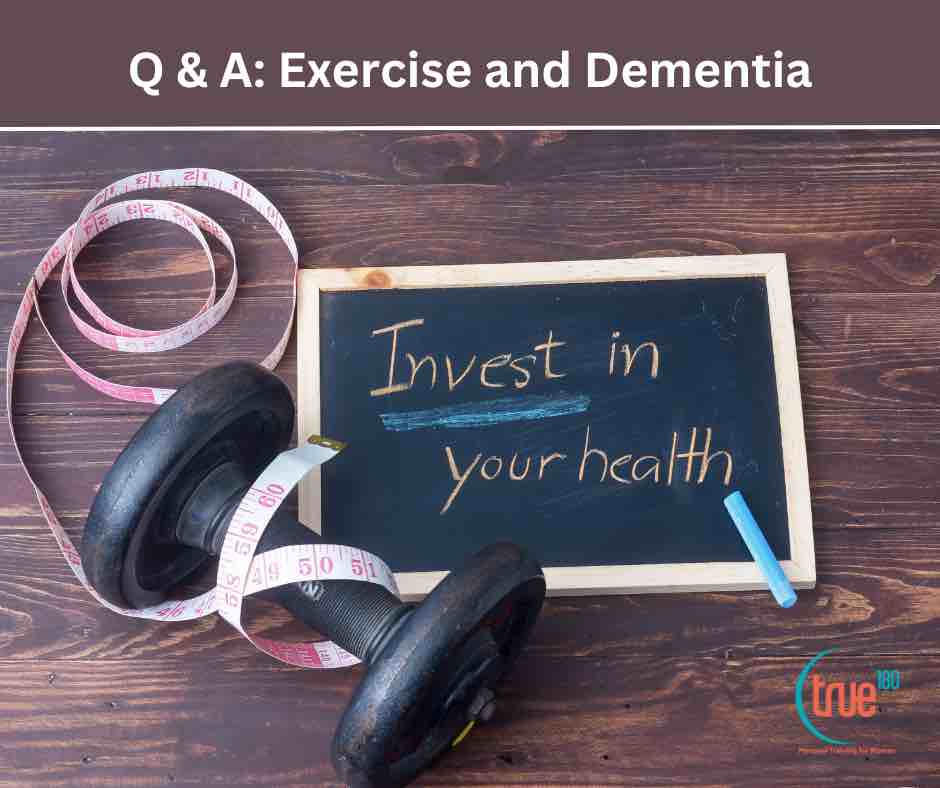Q & A: Exercise and Dementia
Q: If dementia runs in my family can exercise help me?
A: Yes. We’ve had a handful of clients who started out unable to remember a single exercise – meaning if we gave them squats for 15 reps they would forget what they were doing around rep #5 and ask “what was I doing?”
I was worried because they’d have zero recollection of instructions from 30 seconds ago, however with time, consistency, and high expectations for them they have all been able to remember at least 3 exercises to rotate between. I am beyond proud of them.
Train Your Body for Your Brain
I recently completed a certification on brain health and aging. The excessively wordy course could be summarized like this “Regular and intense exercise will be one of the best things you can possibly do to maintain or improve the health of your brain.”
· Exercise helps prevent the loss of grey and white matter. (In other words, it keeps your brain from shrinking)
· Exercise (intense) stimulates hormones such as NGF (nerve growth factor) and BDNF (brain derived neurotrophic factor) which are essential for learning, memory, neuron (brain cell) survival and the creation of new neurons. (In English, It allows your brain to be healthy, remember things, etc.)
· Exercise helps to slow, halt and/or reduce tau protein and beta-amyloid plaque, which have been called “the trigger and the bullet of Alzheimer’s”
Genes Are Not Destiny
The old idea was that genes are the blueprint for your body. However, we have know since the 1960’s that this was not true, but old ideas die hard. It turns out that only 2% of our DNA are direct blueprints, and much of the other 98% exist to respond to our environments and lifestyle.
Bringing this back to exercise, exercise changes how your body uses the 2% of your DNA. In the simplest terms: exercise turns on and/or up good things in your DNA, and off and/or down bad things.
Aging Is Not a Disease
If we are lucky we grow old. No matter what a CGI-enhanced Cindy Crawford* tells your about her new anti-aging skin care line, our bodies look different with time. We give pejorative, disease-like names for all parts of the normal aging process:
· Normal changes to your skin are called rhytids, aka “wrinkly face disease.”
· Normal changes to your spine are called degenerative disc disease**.
· The normal slowing in the speed of nerve impulses*** is called age associated cognitive decline.
*In her commercials for her anti-aging skin care lane the super model has been de-aged via CGI.
**96% of people over 80 who do not have back pain have so called disc degeneration. In other words what we call “degeneration” is normal aging.
***No matter how well you take care of yourself, nerve impulses slow down with age. This has many implications from slower memory retrieval to slower reaction times. E-athletes (so called video game athletes) are too slow to compete and have to retire at 24 years of age because the milliseconds of thumb delay can’t be offset by strategy as aging athletes do in real sports.
Bottom Line
Self-care is the best gift you can give to anyone or anything that counts on you. This is your family, friends, pets, coworkers, etc. We all need each other, and watching your parents fall apart due to their own neglect is torture in slow motion. Here’s where to get started.
I hope this helped answer your question regarding exercise and dementia.

